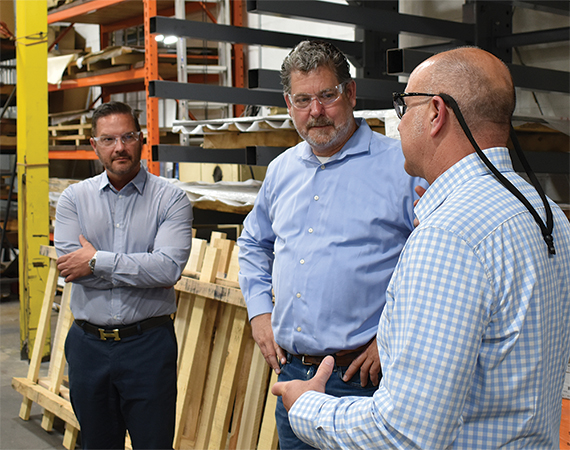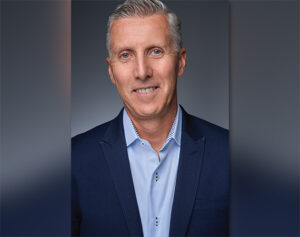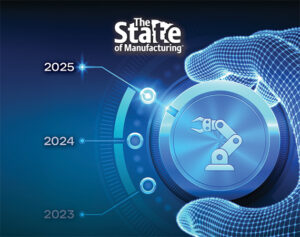Enterprise Minnesota’s Bob Kill and Lynn Shelton recently joined Reps. Duane Quam and Greg Davids for a tour of Valley Design, a table-base maker that employs 87 people in Fountain, a tiny Minnesota community of 234 people about a half-hour southeast of Rochester. The tour illustrated the outsized economic role manufacturers often play in their respective communities. Kill is Enterprise Minnesota’s president and CEO and Shelton is vice president of marketing and organizational development.
Butch Isensee, Valley Design’s CEO, and his son, Luke Isensee, the company’s vice president of sales and heir-apparent, had planned for about a one-hour visit, but it stretched to more than twice that length, as the lawmakers and manufacturers talked shop and policy.
The junior Isensee says he feels there’s previously often been “a disconnect” between the state legislature and manufacturers regarding the value of the jobs they provide and the work they do.
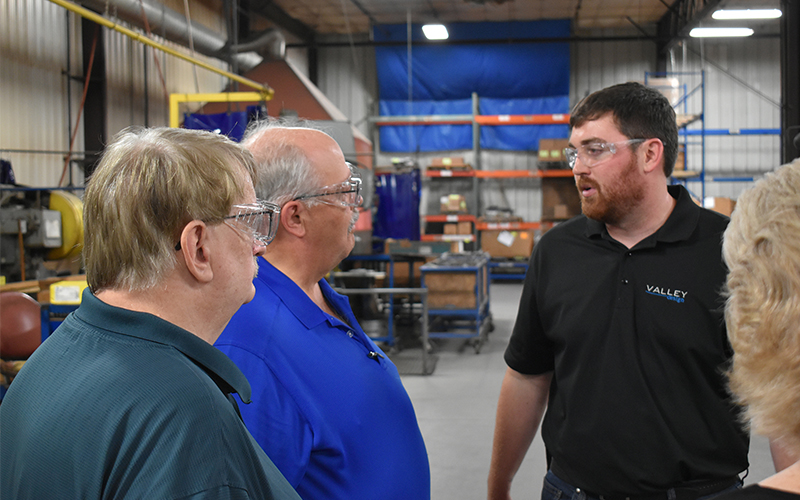
Butch Isensee says they also wanted to advocate for more state funding for Enterprise Minnesota so it can help manufacturers like Valley Design grow and thrive.
In 2023, Valley Design expanded its operations and added to its equipment line. The Isensees walked Quam and Davids through their 110,000-square-foot facility, showing off their powder-coating lines, their machine-cutting centers, and laser technologies.
Butch Isensee launched Valley Design 38 years ago and is planning to turn over the reins to his son, Luke. He says Enterprise Minnesota has been working with Valley Design to ensure a smooth transition.
The elder Isensee says he certainly could sell the company. But that could lead to the work potentially migrating out of state. That doesn’t sit well with him.
“Then all of our people wouldn’t have jobs. So, it feels like our responsibility to really keep this going,” he says. After all, Valley Design is far and away the largest employer in Fountain.
“Loyalty goes two ways,” Luke Isensee says, noting that the company has a number of people who have been with the business for 20-plus years. “They’re loyal to us, and we’re loyal to them.”
The Valley Design tour was just one of some 500 tours that Enterprise Minnesota has orchestrated over the past 17 years to help enhance relations between manufacturers and their legislators.
Shelton says the tours originally were inspired by the realization that many manufacturers were so focused on their products and customers that they paid little attention to how proposed new legislation and regulations could affect their ability to grow profitably, often until it was too late.
“We decided to become a matchmaker,” she continues.
On top of that, Shelton says the plant tours provide decision-makers with a greater appreciation for all that manufacturers contribute to both their communities and the state as a whole.
“And to do that, we have to create some visibility,” she says.
“We want to help connect all things that affect manufacturing in Minnesota,” she continues. That means bringing together policymakers, business leaders, economic development agency representatives, and educators from both the high school and college levels. Former U.S. Congressman Tim Penny, president of the Southern Minnesota Initiative Foundation, says manufacturing tours give legislators not only a first-hand appreciation of the manufacturing facilities in their region but of the increasingly complex workforce issue manufacturers face.
As a former legislator and member of Congress, Penny says he took “every opportunity” to visit local manufacturers, “because you really get a deeper understanding of the nature of these businesses, the skill sets they need in their employees, and the contributions they make to their communities.”
Here is a snapshot of four other tours that produced meaningful results.
Modern Metal Products
Shawn Pfieffer, president of Modern Metal Products, for example, recently welcomed Sen. John Jasinski and Rep. John Petersburg into his Owatonna plant for a tour that led to a lively conversation about the impact of the state’s new earned sick and safe time requirements. The lawmakers outstayed their scheduled visit to talk shop with Pfieffer and his brother and business partner, Jason.
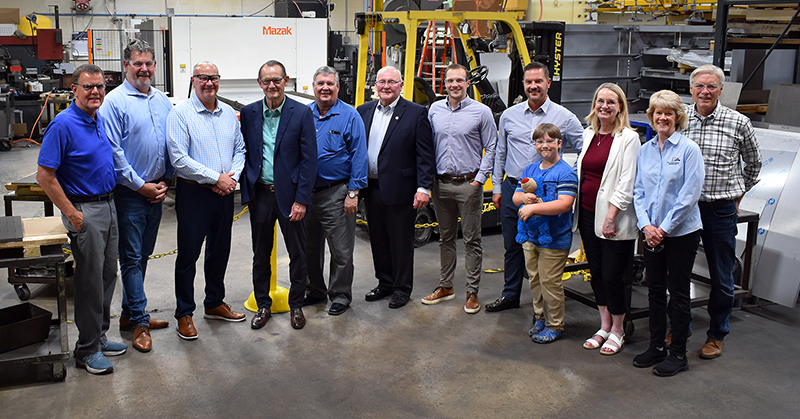
Pfieffer says he hopes legislators will consult with business leaders as they consider future employment legislation, noting: “There’s nothing better than being in somebody’s contact list.”
Modern Metal Products has been in business for 99 years and manufactures metal enclosures. The company, which currently employs about 40 people, has provided steady employment for generations of workers, often including multiple family members, Pfieffer says. The company originally made metal boxes largely for the U.S. military but now manufactures metal containers for all manner of public health and safety items, from defibrillators to Narcan.
He calls his company “a community gem that probably just doesn’t get a lot of shine.”
He agrees that new state regulations can be a burden, but admits that the recent law that addressed earned sick and safe time benefits prompted the company to evaluate its current package.
“We thought we had a good benefit offering prior to this legislation going into effect. But it gave us an opportunity, to ask: ‘How good does this look?’” he says.
Pfieffer says that’s a valuable question in a world where manufacturers struggle to recruit and retain talent.
“While it was a challenge, it also made us look inward and ask: ‘Are we who we want to be?’” Pfieffer says.
Metal Services
Kurt Schrom, CEO of Metal Services in Blooming Prairie, just south of Owatonna, hosted Sen. Gene Dornink for a tour of the company’s facility in September. He describes the legislative visit as “worth its weight in gold.”
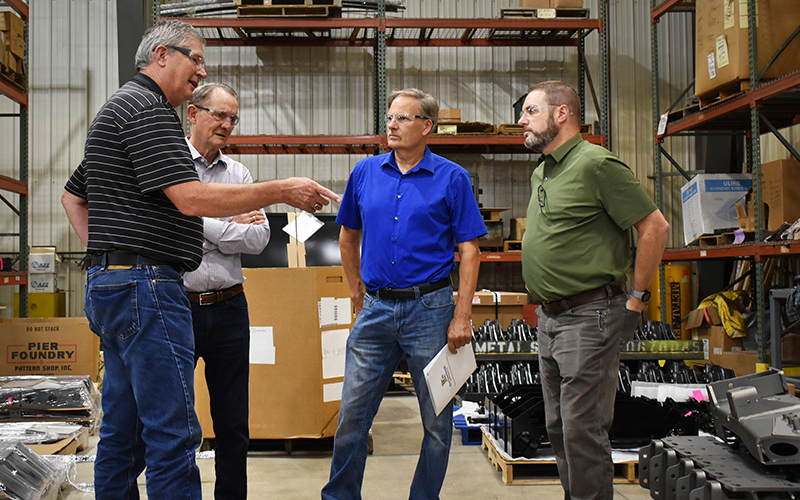
Metal Services is a low-volume, high-complexity job shop that fabricates and supplies parts primarily for OEM manufacturers. He says Metal Services’ workforce typically ranges between 42 and 45 people. “Sen. Dornink got to see what we do,” Schrom says, describing him as “a good listener” who seemed somewhat surprised to learn about the many ways Enterprise Minnesota has been helping manufacturers up their game.
“It probably goes without saying that small businesses create jobs. It shouldn’t matter what your political affiliation is,” Schrom says. “Creating jobs is good for everyone. Nobody loses in that deal.” The legislative
agenda for most manufacturers hosting a tour, Schrom says, will probably be: “Don’t tie our hands with rules that negatively impact us.” The current keen competition for workers already compels manufacturers to provide attractive pay and benefit packages, he says, eliminating the need for a heavy-handed legislative approach.
Nearly all manufacturers appear united on one front: a desire to slake their thirst for more qualified workers.
“The key message we want to send is: It’s okay to work with your hands. It’s okay to be a welder. It’s okay to be in the trades,” Schrom says.
Sen. Jasinski agrees. He says that message needs to reach not just young people but their influencers, including parents and teachers.
Backdraft Manufacturing
Tyler LeBrun, owner and CEO of Luverne-based Backdraft Manufacturing, welcomed local legislators Sen. Bill Weber and Rep. Joe Schomacker into his high-tech plant this past summer. Backdraft specializes in designing, engineering, fabricating, and integrating machines to automate production in a wide variety of industries, including the manufacturing of products for the construction, agricultural, medical device, and aerospace sectors.
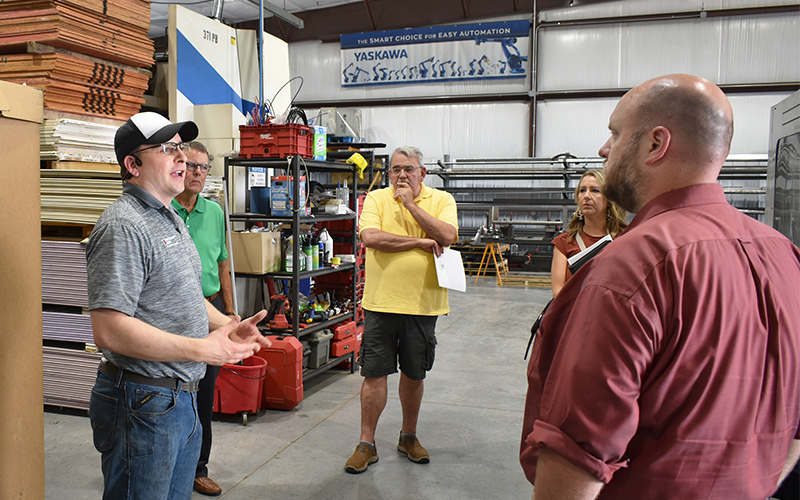
“I think it helps to get local legislators in to see some of the challenges we face due to the state’s overbearing regulatory environment,” he says.
That point wasn’t lost on Sen. Weber, who notes that Minnesota has already lost manufacturers to states with less burdensome expectations of employers.Weber says communities such as Luverne, just 12 miles away from the South Dakota border, have been particularly vulnerable.
“Crossing that state line is not that big of a move, and we’ve seen a lot of businesses make it,” he says, pointing to the departures of Luverne Truck Equipment and Luverne Fire Apparatus, which both opted for South Dakota.
LeBrun says some of the costs of new employment rules have been difficult to absorb for a small business with little in the way of human resources support. Backdraft Manufacturing had 11 people on its payroll in Luverne as of September, although LeBrun says that number fluctuates with project load.
LeBrun says visitors are often surprised by the sophistication of the work performed in his shop.
Sen. Weber was no exception, saying that the business has made great technological strides since he first toured it about five years ago.
“They’ve expanded and added a lot of equipment,” he says. “I’m impressed by what they’re capable of doing these days.”
The shop’s advances have been driven by necessity, according to LeBrun. “No one is going to trust you to build robots out of a garage,” he says.
Advanced Coil Technology
General Manager Devon Barnes at Advanced Coil Technology says he didn’t need any convincing to host a plant tour for legislators Jasinski and Petersburg, with Enterprise Minnesota staff accompanying.
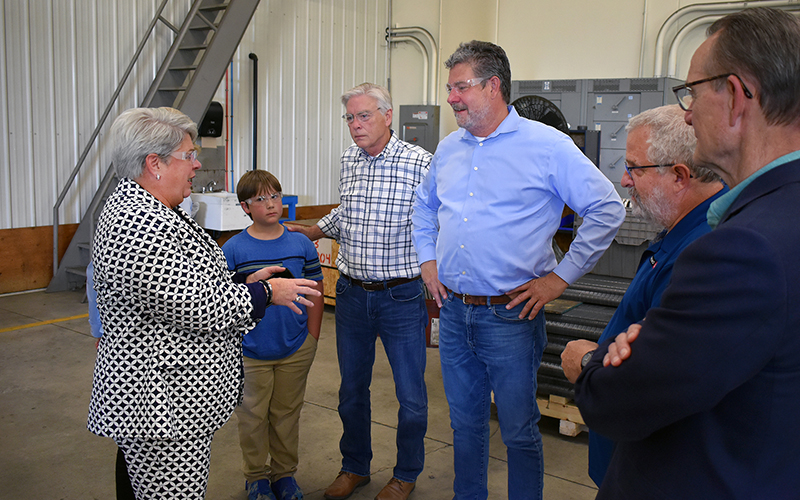
“If I can get anyone in the building, that’s a win — a customer, a supplier, a partner, or a legislator. We’ve always had an open-door policy.”
Barnes harbors no illusions about what the tour likely achieved.
“I know that one visit is not going to change legislation. But we can at least get our message out there,” he says, noting the collective value of manufacturers sharing their stories.
When Advanced Coil needs to hire additional staff to document the company’s compliance with state mandates, Barnes says: “All you’re doing is raising our overhead costs.” He explained these sorts of added costs threaten to put the business at a disadvantage against competitors from other states.
Rep. Petersburg agrees, pointing to the “large regulatory overreach” of the last state legislative session. “A lot of bills were passed without really understanding the consequences and the outcomes that would be generated.” He says those actions left many companies — especially in Greater Minnesota — asking, “How does this work?”
Unfortunately, Petersburg admits, even state officials sometimes struggle to answer that question.
Touring businesses can provide legislators with insight into the consequences of their actions, he says.
“It really does help us figure out how to fine tune, how we can fix things, and adjust to what works and what doesn’t work. The problem, of course, is it usually takes a few years before we understand that. And in the meantime, companies have to deal with it, sometimes without the best outcomes,” Petersburg says.
Sen. Jasinski says the tour underscored the difficulty for small- and mid-sized businesses to compete when government takes a one-size-fits-all approach to regulation, often failing to differentiate between companies of different scale when mandating employee benefits and requiring proper documentation.
“Most employers in a free market are going to provide the best benefits they can anyway, because they need to be competitive. But they just get bogged down, needing to comply with all these state mandates,” Jasinski says.
Rep. Petersburg concurs: “These guys are being swamped with accounting requirements and regulations, while they’re not receiving great direction from the state agencies to tell them exactly what needs to be done.” He pointed to confusion even at the state regulatory level about exactly what documentation is required for companies to demonstrate their compliance in providing mandated employee-leave programs.
He warns that the state’s economy runs the risk that excess regulations will chase away manufacturers.
“Most smaller businesses stay here because they love their communities and their people. But if the cost of doing business is so high that they can’t make it work, they’ll go someplace else,” he says.
Barnes says Advanced Coil recently recalculated a four-year-old quote for a client and discovered that his overhead costs had climbed 50%.
“That is just my cost of being here in Minnesota and keeping my employees happy,” he says. “That’s not sustainable.”
At Advanced Coil, Barnes says visitors often are surprised by the scale of the work being done, and it’s a point of company pride.
The company manufactures industrial heat-transfer systems, particularly those made to withstand high-pressure, high-temperature, and sometimes corrosive environments. Its clients include papermakers and processors of grain and oilseeds.
The company is nearly 30 years old and has a staff of 17, with about half of employees working on engineering and design and the remainder handling fabrication, largely welding.
Advanced Coil tackled a project earlier this year for a hypersonic wind tunnel, shipping a custom-designed, self-contained metal system that weighed about 90,000 pounds to its client upon completion.
Barnes says some ask why his Owatonna shop would take on such massive and ambitious projects. His answer? “Because no one else will.”
It’s the nature of Advanced Coil’s business, according to Barnes.
Pointing to another example, he says: “We’re doing a massive, custom-designed, never-been-done-before air handler for the largest fertilizer plant in the U.S. That ships next week.”
“People are coming to understand that these are good, rewarding jobs,” Barnes says.
Return to the Winter 2024 issue of Enterprise Minnesota® magazine.
